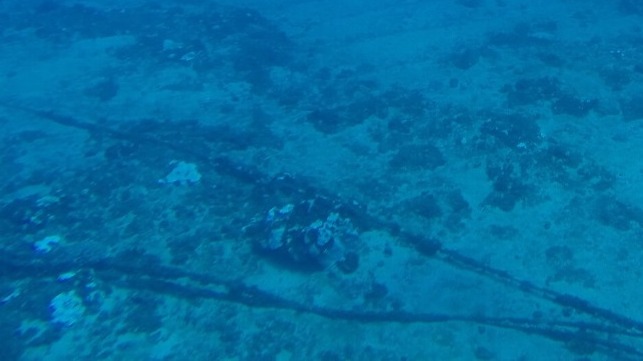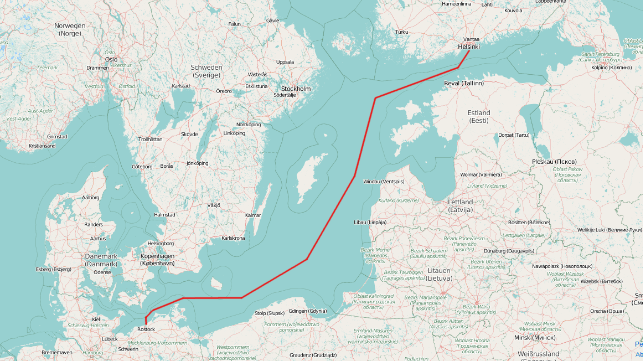COLD WAR 2.0
Danish military says it’s monitoring Chinese ship closely after undersea cables severed
Denmark's navy said Wednesday that it was shadowing Chinese cargo vessel Yi Peng 3, which is anchored off the Danish coast. While the navy has not given any reason for its presence near the idle ship, the announcement comes a day after Finland and Sweden opened investigations into the suspected sabotage of two undersea fibre-optic cables.
Issued on: 20/11/2024 -
By: NEWS WIRES
Video by: Camille KNIGHT
The Danish military said on Wednesday that it was staying close to a Chinese ship currently sitting idle in Danish waters, days after two fibre-optic data telecommunication cables in the Baltic Sea were severed.
Chinese bulk carrier Yi Peng 3 was anchored in the Kattegat strait between Denmark and Sweden on Wednesday, with a Danish navy patrol ship at anchor nearby, MarineTraffic vessel tracking data showed.
"The Danish Defence can confirm that we are present in the area near the Chinese ship Yi Peng 3," the military said in a post on social media X, adding it had no further comments.
Swedish police later told news agency TT they were also interested in the Yi Peng 3, adding there might be other vessels of interest to Sweden's investigation.
The Chinese ship left the Russian port of Ust-Luga on Nov.
15 and was in the areas where the cable damages occurred, according to traffic data, which showed other ships to have been in the areas too.
One cable running between Sweden and Lithuania was cut on Sunday and another one between Finland and Germany was severed less than 24 hours later on Monday.
The breaches happened in Sweden's exclusive economic zone and Swedish prosecutors started a preliminary investigation on Tuesday on suspicion of possible sabotage.
A Chinese government spokesperson told a daily news briefing on Wednesday that it always required its vessels to abide by relevant laws and regulations.
"We also attach great importance to the protection of seabed infrastructure and, together with the international community, we are actively promoting the construction and protection of submarine cables and other global information infrastructures," the spokesperson said.
European governments accused Russia on Tuesday of escalating hybrid attacks on Ukraine's Western allies, but stopped short of directly accusing Russia of destroying the cables.
Asked about the matter on Wednesday, Kremlin spokesman Dmitry Peskov told a regular news briefing: "It is quite absurd to continue to blame Russia for everything without any reason."
(Reuters)
Danish PM ‘Not Surprised’ If Sabotage Caused Subsea Cable Damage
By Sanne Wass

(Bloomberg) -- Danish Prime Minister Mette Frederiksen said she would not be taken aback if the severing of two data cables in the Baltic Sea a few days ago was found to be intentional.
“If the immediate assessment is that this is sabotage, and that it comes from outside, then it is obviously serious. I am not surprised that it could happen,” Frederiksen according to a report by news agency Ritzau on Wednesday.
A high-speed data cable connecting Finland and Germany was cut early Monday by what was likely an external impact, according to Finnish authorities. That incident and damage to a nearby link between Lithuania and Sweden, uncovered Sunday, are being probed by Swedish police as possible sabotage, and German Defense Minister Boris Pistorius on Tuesday said the events have to be investigated as such an act.
There’s a high likelihood that a 1,200-kilometer (750-mile) high-speed fiber optic Helsinki-Rostock link serving data centers is completely cut as all of its fiber connections are down, its owner Cinia Oy has said. A repair ship expected to reach the site next week is due to try and identify what caused the breakage.
All four nations affected by cable breaches are also members of the North Atlantic Treaty Organization. Just over a year ago, the anchor of a passing ship severed two data cables and a gas pipeline on the seabed of the Gulf of Finland, and the military bloc pledged to respond if the damage proved to be intentional.
In his remarks, Pistorius pointed to Russia as posing a hybrid and military threat to the European Union. Russia has denied involvement in any of the incidents.
©2024 Bloomberg L.P.
After Subsea Cable Damage, Five Nations Warn of Russian Hybrid Warfare

On Tuesday, just days after two Baltic subsea cables were severed in a suspected intentional attack, five European countries issued a condemnation of Russian espionage activities within the EU. The message addressed a broad, ongoing campaign of Russian sabotage operations against Ukraine's allies.
"Russia is systematically attacking European security architecture. Moscow’s escalating hybrid activities against NATO and EU countries are also unprecedented in their variety and scale, creating significant security risks," the foreign ministers of France, Germany, Italy, Poland, and Britain said in a statement after a meeting in Warsaw. "We are determined to stand united with our European and transatlantic partners to think and act big on European security."
The two subsea cables were cut last weekend in back-to-back incidents. On Sunday morning at 0800, a subsea fiber connection between Lithuania and the strategic island of Gotland, Sweden went out of service due to physical damage. Overnight, the C-Lion1 cable between Finland and Germany was also severed. According to Finland's state telecom company, Cinia, the line may have been cut by an "outside force."
Carl-Oskar Bohlin, Sweden's civil defense minister, said Tuesday that there were notable ship movements in the vicinity of the cable damage sites at the time of the outages. Without identifying the vessels, he said that "we of course take this very seriously against the background of the serious security situation."
Open source intelligence analysts have identified a possible suspect vessel, the bulker Yi Peng 3, which displayed unusual course and speed changes while on an outbound voyage from St. Petersburg at the time of the outages. The ship was intercepted by the Danish Navy, and as of Tuesday it was anchored in the Kattegat.
European security officials suspect that the cable breaks were acts of sabotage, and though they have not identified a culprit, Russia ranks high on the list: it has a strong motive due to European support for Ukraine, a recent history of covert attacks on EU targets, and well-developed technical capabilities for seabed warfare.
"No one believes that these cables were accidentally damaged. And I don't want to believe in the versions that anchors are to blame," said German Defense Minister Boris Pistorius on Tuesday. "So we have to conclude, without knowing who did that, that this is a hybrid action. And we also have to assume, without knowing, of course, that this is sabotage."
Dutch Defense Minister Ruben Brekelmans edged closer to naming Russia as a primary suspect. "We see increasing activity of especially Russia on our seas, aimed at espionage and possibly even sabotage of our vital infrastructure," he noted in comments to the Dutch press on Tuesday.
The last major subsea infrastructure incident in the Baltic occurred in October 2023, and it was attributed to a Chinese container ship, the NewNew Polar Bear. As the vessel transited across the northeastern Baltic Sea towards St. Petersburg, it trailed an anchor along the bottom for hundreds of nautical miles, rupturing the Baltic connector gas pipeline and severing two fiber-optic cables.
A far larger attack on the Nord Stream pipeline system in 2022 has not been formally solved, but multiple investigations point towards Ukrainian actors, potentially with government backing.
Two Baltic Subsea Cables Likely Severed by "Outside Forces"

Two Baltic subsea cables connecting four different NATO nations have likely been severed, according to officials in Finland and Sweden.
The first fiber-optic line in question is the C-Lion1 cable, which runs about 750 miles from Helsinki, Finland to Rostock, Germany. According to Finland's state telecom company, Cinia, the line may have been cut by an "outside force." A cable ship is preparing to get under way to make repairs, but fixing the damage could take up to two weeks.
At about 0800 GMT on Sunday, a subsea fiber connection between Lithuania and the strategic island of Gotland, Sweden also went out of service, according to Swedish telco Telia. By the nature of the failure, the company believes that the cause was physical damage to the cable, a spokesperson told CNN.
Suspicion immediately turned to "intentional damage," and to Russia. "Our European security is not only under threat from Russia's war of aggression against Ukraine, but also from hybrid warfare by malicious actors," the Finnish and German foreign ministers said Monday in a joint statement. "Safeguarding our shared critical infrastructure is vital to our security and the resilience of our societies."
Subsea fiber optic infrastructure is an attractive target: it can be attacked covertly with deniable methods, it is hard to defend, and - if enough damage is done all at once - an interruption could have a major impact on Western economies.
In September, U.S. officials warned that Russia has increased its military activity near strategic subsea cables. The Russian military has been actively mapping NATO members' subsea infrastructure, maintains extensive capabilities for covert subsea interference, and has a motive for gray-zone retribution due to ongoing European support for Ukraine. It would not be a first: Russian intelligence agencies like the GRU are believed to be behind a series of recent sabotage attacks across Europe, likely connected to the EU's backing for Kyiv. "We've seen arson, sabotage and more," UK intelligence chief Ken McCallum said in October. "Dangerous actions, conducted with increasing recklessness."

No comments:
Post a Comment